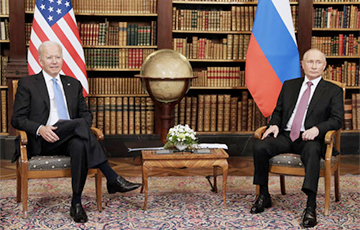Political Scientist: The Author of the "Moldovan Scenario" Attended the Summit in Geneva
12- 17.06.2021, 16:37
- 42,420

What is left behind the official report of the Geneva summit?
Head of the Center for Strategic and Foreign Policy Studies Arsen Sivitski commented on the discussion of the Belarusian issue at a meeting between US President Joe Biden and the head of the Kremlin Vladimir Putin in Geneva.
- It is significant that Belarus was discussed in the block of issues of regional conflicts and crises, on a par with the Libyan, Syrian, Venezuelan, Nagorno-Karabakh, and Ukrainian crises. This suggests that our issue was not discussed for show, and that, in general, Moscow and Washington have an understanding that the Belarusian crisis has really turned into an international problem.
The interlocutor believes that, although the priority of the topic of the Belarusian issue was inferior to the rest, nevertheless, enough attention was paid to it for the parties to reach an intermediate solution:
- It is clear that one cannot expect that Putin or Biden will completely shed light on the nature of these agreements in public. Most of the topics were discussed in a confidential format since there were a lot of them, and the parties cannot always take an open public position on all of them. The Belarusian question is one of those.
Nevertheless, in his opinion, the Russian side has a plan for resolving the Belarusian issue and tried to enlist the support of the West in the negotiations.
- It is obvious that Moscow has its own vision, its own plan of how to resolve the political crisis in Belarus. Its main points are contained in the so-called “Sochi agreements” of September last year, and they suggest that the Belarusian leader should enter into a national dialogue with the opposition, begin political reform through constitutional amendments, and, accordingly, hold new elections without participating in them.
For this, he was offered some kind of guarantees, personal, financial, possibly some kind of political haven on the territory of the Russian Federation.
The Kremlin unsuccessfully tried to push through this scenario, and by the end of last year, when Lukashenka was able to stabilize the political situation by brutally suppressing protests and repressions, he exhausted the tools of political and diplomatic pressure and realized that, in this way, it can't force Lukashenka to comply with the Sochi agreements.
Therefore, I think, as an alternative, Moscow is ready for tougher approaches. But they were afraid to implement them because of the risk of US sanctions. Because tough steps can be regarded as interference in the internal affairs of Belarus in order to undermine its sovereignty and independence.
From this point of view, the summit was very important for the Kremlin in order not only to reconcile its positions but also to get a kind of "green light" for the implementation of these tougher approaches.
I think that the Belarusian issue was discussed exactly in this format and I do not exclude that, in the future, the synchronization of actions between Russia and the West with regard to Belarus will grow, the analyst predicts.
First of all, he means the synchronization of economic pressure, the consequences of which the Belarusians will be able to feel in the fall.
- Russia will, in fact, synchronize its economic pressure on Minsk with the sanctions pressure from the West, which also implies the introduction of sectoral sanctions. And we saw that Moscow is already doing this in fact - it is cutting oil supplies, reducing gas transit, allegedly due to secondary US sanctions.
As pressure from the West intensifies, the Kremlin will play on these sanctions in order to justify its direct steps to put pressure on official Minsk.
It is obvious that Aliaksandr Lukashenka has exhausted the financial resource of support from the Kremlin, and, in the event of an escalation of sanctions pressure from the West, a very serious socio-economic crisis can be expected in autumn, which Moscow will undoubtedly use to interfere in the internal affairs of Belarus and finally remove Aliaksandr Lukashenka from power, the expert believes.
Along with economic pressure, relying on the facts of recent history, the analyst does not exclude other scenarios for a change of power in Belarus.
Moreover, there is an example when the Kremlin implemented such approaches not unilaterally, but in coordination with Western partners. This is the creation of a so-called anti-oligarchic coalition between Moscow, Washington, and Brussels to resolve the 2019 Moldovan political crisis.
It is significant that the author of that decision on Moldova took part in the negotiations in Geneva just during the discussion of the block of regional conflicts. I'm talking about the deputy head of the presidential administration of the Russian Federation, curator of the post-Soviet space Dmitry Kozak. His presence was conditioned not only by the discussion of Ukrainian but also Belarusian issues, - suggested Arsen Sivitski.










